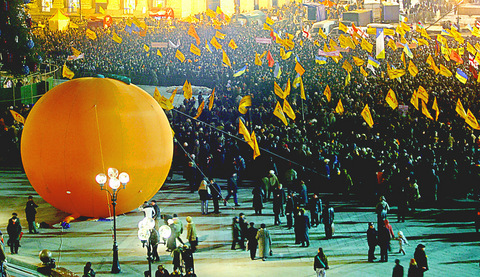On a crooked lane in the Crimean capital the afternoon prayer in the Kebir mosque has just let out and a group of believers gathers beneath its lone minaret to say their presidential vote in Ukraine's weekend ballot will be a vote against Russia.
It is a heartfelt sentiment among Crimea's quarter of a million Tartars who make up 12 percent of the peninsula's population.

PHOTO: AP
More than 60 years have passed since the Soviet Red Army drove the entire Tartar population from Crimea at gunpoint on suspicion of collaborating with the Nazis during World War II and it has been more than a decade since Ukraine parted ways with Russia.
But the Tartars still regard Moscow's policies with deep distrust.
"Better dirty American democracy than Russian totalitarianism," said Muhamad Vilor Osmanov, a Tatar student in a local university who like many of his kin opposes the Russian-speaking, Moscow-backed presidential candidate Viktor Yanukovich.
Yanukovich, who has pledged closer ties to Russia and official status for the Russian language in Ukraine if he is elected, had Russian President Vladimir Putin's backing from the beginning of the campaign.
He has proved massively popular with the Russian-speaking populations elsewhere in eastern and southern Ukraine, but Crimea's Islamic residents do not share that enthusiasm for Moscow's man.
"If Yanukovich comes to power he will emulate Putin's regime. Look at the mess he made in Chechnya," Osmanov said of the Russian president.
The Tartars' relationship with the much larger Russian population of the Crimean peninsula has never been easy.
In 1944, more than 200,000 Crimean Tartars, descendants of the Mongol Golden Horde, were deported to Siberia and Central Asia.
And for centuries the Russian Empire fought bloody wars with the Tartars' ethnic cousins from Ottoman Turkey to retain control of this strategic Black Sea territory, which was only signed over to Ukraine in 1956 by the late Soviet leader Nikita Khrushchev.
But the elections have pitted the two communities against each other anew ahead of a rerun presidential vote scheduled for Sunday.
The Tartars' modest tent camp in support of the Western-leaning Viktor Yushchenko -- modeled on the massive opposition tent city which sprang up in Kiev after a contested November ballot -- is overshadowed by masses of Yanukovich supporters who wave Russian flags and brandish banners reading "Forever with Russia."
Data from the last vote, which was declared invalid by Ukraine's top court due to massive fraud and ballot-rigging, point to a vote along ethnic lines with some 16 percent of the population voting for Yushchenko and 82 percent for Yanukovich.

Tens of thousands of Filipino Catholics yesterday twirled white cloths and chanted “Viva, viva,” as a centuries-old statue of Jesus Christ was paraded through the streets of Manila in the nation’s biggest annual religious event. The day-long procession began before dawn, with barefoot volunteers pulling the heavy carriage through narrow streets where the devout waited in hopes of touching the icon, believed to hold miraculous powers. Thousands of police were deployed to manage crowds that officials believe could number in the millions by the time the statue reaches its home in central Manila’s Quiapo church around midnight. More than 800 people had sought

DENIAL: Pyongyang said a South Korean drone filmed unspecified areas in a North Korean border town, but Seoul said it did not operate drones on the dates it cited North Korea’s military accused South Korea of flying drones across the border between the nations this week, yesterday warning that the South would face consequences for its “unpardonable hysteria.” Seoul quickly denied the accusation, but the development is likely to further dim prospects for its efforts to restore ties with Pyongyang. North Korean forces used special electronic warfare assets on Sunday to bring down a South Korean drone flying over North Korea’s border town. The drone was equipped with two cameras that filmed unspecified areas, the General Staff of the North Korean People’s Army said in a statement. South Korea infiltrated another drone

COMMUNIST ALIGNMENT: To Lam wants to combine party chief and state presidency roles, with the decision resting on the election of 200 new party delegates next week Communist Party of Vietnam General Secretary To Lam is seeking to combine his party role with the state presidency, officials said, in a move that would align Vietnam’s political structure more closely to China’s, where President Xi Jinping (習近平) heads the party and state. Next week about 1,600 delegates are to gather in Hanoi to commence a week-long communist party congress, held every five years to select new leaders and set policy goals for the single-party state. Lam, 68, bade for both top positions at a party meeting last month, seeking initial party approval ahead of the congress, three people briefed by

Cambodia’s government on Wednesday said that it had arrested and extradited to China a tycoon who has been accused of running a huge online scam operation. The Cambodian Ministry of the Interior said that Prince Holding Group chairman Chen Zhi (陳志) and two other Chinese citizens were arrested and extradited on Tuesday at the request of Chinese authorities. Chen formerly had dual nationality, but his Cambodian citizenship was revoked last month, the ministry said. US prosecutors in October last year brought conspiracy charges against Chen, alleging that he had been the mastermind behind a multinational cyberfraud network, used his other businesses to launder